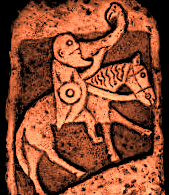This is a short post of a different kind. I do not usually burden readers with poetic effusions, but here I make an exception. I recently learned of the death of Dundee-born Charles Sharpe, long-time resident of Totnes in Devon, who, however, never forgot his early days in Dundee, particularly in Lochee. He also retained a keen interest in the wider hinterland of Angus where he roamed and where his ancestors came from. He was a teacher, educator, psychotherapist, and a worthy humanist, as can be seen by reading his still available blog, Leaving Dundee. (It can be seen here).
We never met and corresponded only intermittently about various topics concerning the 'mither country'. His comments were always encouraging, generous and intelligent. The Courier's notice of his death is: here
One County Over
An end of an Auld Sang as they truly say, entered into the long rest
at last in gentle Devon (while I labour still, one county over, in the Cornish clay.)


